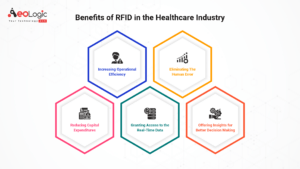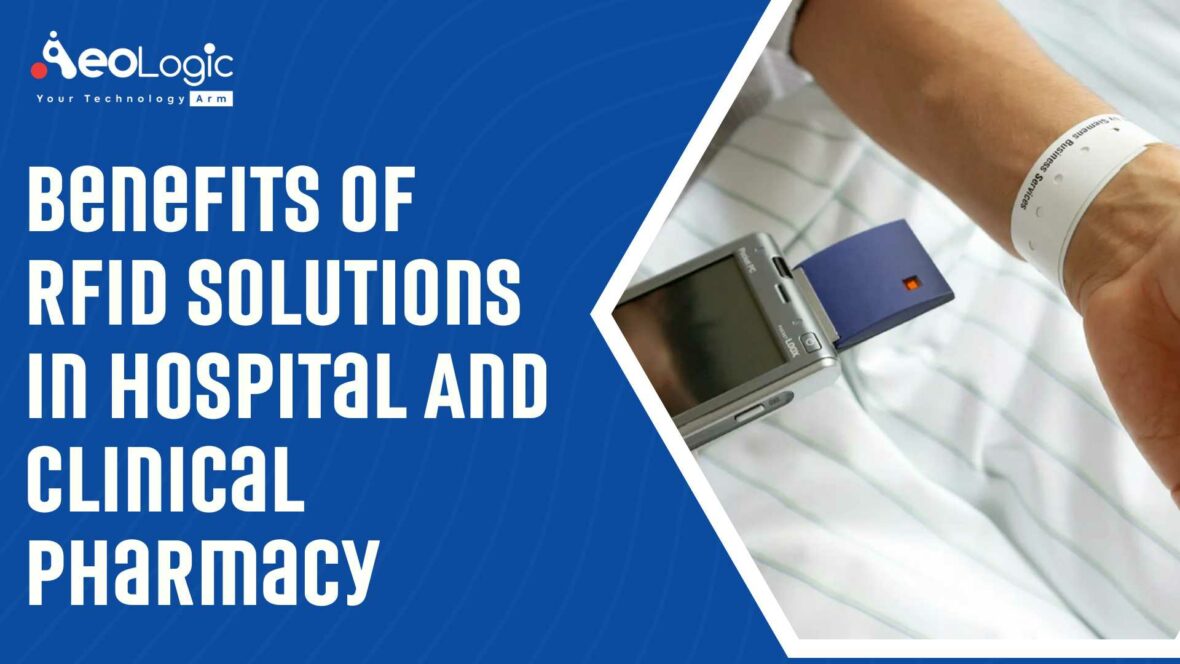For a moment, the imitation of drugs has spread like wildfire, not just playing as a grave economic peril to the pharmaceutical sector. However, it is also jeopardizing public safety and security. Though new laws and regulations along with many other factors have been taken to lessen the menace. It appears that the most reassuring one is the choice of Radio Frequency Identification (RFID) technology. Therefore, in this blog we will be sharing the benefits of RFID solutions in hospital and clinical pharmacy.
Also read: RFID Solutions for Healthcare Industry
What is RFID?
Radio Frequency Identification (RFID) is a special type of radio technology that employs radio waves. In order to recognize tags attached to an object and hence identifies the object.
RFID tech is observed to play a crucial role in the healthcare industry for recognizing counterfeit drugs, improving traceability, and reducing mix-ups and other mistakes common at hospitals and pharmacies. Nonetheless, there are several benefits of RFID solutions in hospital and clinical pharmacy.
Plausible Application of RFID in the Pharmaceutical Sector
Drug Tracing System
A drug tracing system provides combined end-to-end management and control of drugs from the manufacturer and distributor. Through the chain of intermediate wholesalers, to the healthcare organizations that order drugs. And eventually to the patients who get the prescriptions.
For achieving product traceability across various businesses and companies. There is a need for having the potential for distinguishing individual items by barcode or RFID automatic identification tags.
RFID-based tags help in storing large amounts of data, and they also permit further information to be added. Moreover, RFID tags differ in size and are affected by metal, liquid, etc. And hence should fulfill the requirements. Such as the shape, content, and purpose — of different drugs for tracing.
Distribution Departments
For complying with new compulsory history control obligations for biological items, the distribution departments of drug manufacturers and distributors had to execute control. And for tracking at the unit level quickly and grappling to find ways to reduce the increased administrative workload.
Drug Manufacturers
The benefits of RFID solutions in hospital and clinical pharmacy also helps in lessening the manufacturing and distribution of counterfeit drugs. The RFID tag provides a unique identifier that is highly difficult to counterfeit, which facilitates in suppressing the manufacture and distribution of counterfeit drugs.
Counterfeits can cause a loss of sales to pharmaceutical companies. Not only this, the availability of false drugs tarnishes their corporate representation, making it seem that they cannot manufacture safe drugs.
Healthcare Institutions
Hospitals and pharmacies are integrating RFID-based systems. Including a system – that is capable of checking the dosage of wrong drugs. By equaling RFID-tagged drugs with the patient’s RFID-tagged wristband (when drugs are provided to patients).
Subsequently, another RFID-based system is one that is aiding in dispensing drugs. And hence it helps in preventing mistakes in mixing and assembling drugs.
Benefits of RFID Solutions in Hospital and Clinical Pharmacy
There are several benefits for the pharmaceutical industry for incorporating RFID tech into their supply chain.

- The first is, the inventory of drugs. However, it is a difficult task that requires more data and organization than is the case usually. (https://glasshousefarms.org)
- Furthermore, a more productive supply chain would save time and money.
- There is still a more considerable reason – patient safety and security, with a more accurate way of preventing error with drugs
- Companies like AstraZeneca, which have already included RFID, have had tremendous achievements with dispensing over 30 Million RFID-enabled syringes of Diprivan.
FDA Recommendation
The FDA has recommended its system of rules and regulations be implemented in RFID tech in the pharmaceutical sector.
Smart Packaging
Another costly risk to patients’ health is non-compliance in the drug industry. It is somehow confusing for patients about their pills.
Also read: Digital Transformation Examples in Healthcare

Future of RFID in Hospitals
Incorporating the benefits of RFID solutions in hospital and clinical pharmacy will be leading the future of pharmaceutical industry. Hospitals and clinics are preferably adopting tech-based solutions. With increasing number of concerns about patient security and privacy, medical personnel prefers RFID readers or tags over password-based security systems.
Various technologies are there in this landscape for meeting the changing demand of access control and other security requirements in hospitals and clinics.
Market players are now focusing on offering RFID devices and systems.
Get in touch with us if you are looking forward to integrating RFID into your business!
FAQs
Why is RFID important in healthcare?
RFID tracking facilitates medical staff to pinpoint the location of any patient in the hospital. In order to ensure their safety and sustain the care process. Patient tracking is particularly relevant in neonatal units, mental health facilities, pediatric departments, or for tracking geriatric patients.
What are the benefits of RFID?
- It boosts operational efficiency
- It eradicates human error
- Mitigating capital costs
- It grants accessibility to real-time data
- Offering in-depth insights for better decision making.






